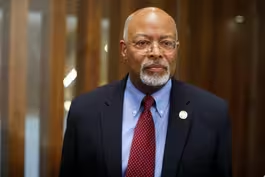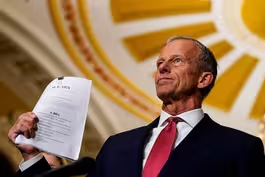
Why mothers with young children are leaving the workforce
Clip: 9/30/2025 | 7m 31sVideo has Closed Captions
Why so many mothers with young children are leaving the workforce
A growing share of mothers with young children in America are leaving the workforce, erasing gains made after the COVID-19 pandemic when working remotely became more common. Economics correspondent Paul Solman reports on the impact.
Problems playing video? | Closed Captioning Feedback
Problems playing video? | Closed Captioning Feedback
Major corporate funding for the PBS News Hour is provided by BDO, BNSF, Consumer Cellular, American Cruise Lines, and Raymond James. Funding for the PBS NewsHour Weekend is provided by...

Why mothers with young children are leaving the workforce
Clip: 9/30/2025 | 7m 31sVideo has Closed Captions
A growing share of mothers with young children in America are leaving the workforce, erasing gains made after the COVID-19 pandemic when working remotely became more common. Economics correspondent Paul Solman reports on the impact.
Problems playing video? | Closed Captioning Feedback
How to Watch PBS News Hour
PBS News Hour is available to stream on pbs.org and the free PBS App, available on iPhone, Apple TV, Android TV, Android smartphones, Amazon Fire TV, Amazon Fire Tablet, Roku, Samsung Smart TV, and Vizio.
Providing Support for PBS.org
Learn Moreabout PBS online sponsorshipAMNA NAWAZ: A growing share of mothers with young children in America are leaving the work force, erasing gains made after the COVID-19 pandemic, when working remotely became more common.
Economics correspondent Paul Solman reports on the impact.
PAUL SOLMAN: Nicoletta Barbera always saw herself as a working mother.
She and husband Stephen (ph) worked for the U.S.
Institute of Peace funded by Congress while raising two sons in Washington, D.C., until March.
NICOLETTA BARBERA, Former Senior Program Officer, U.S.
Institute of Peace: Overnight and with barely any warning, almost the entirety of the work force of the United States Institute of Peace was laid off kind of en masse.
PAUL SOLMAN: DOGE-ed, including both Barbera and her husband.
NICOLETTA BARBERA: The rug was really kind of taken out from under us because we not only went from two incomes to zero incomes.
We went from having a family health insurance policy for us and our two young children to no health insurance.
PAUL SOLMAN: Even moms who haven't been asked are leaving their jobs, especially in the back-to-the-office federal government.
MISTY HEGGENESS, University of Kansas: Those positions are predominantly held by women and, in particular, women with children, who often are willing to forgo wages in the private sector for more flexible work environments, work environments that historically the federal government has provided.
PAUL SOLMAN: But now the share of working mothers with children under 5 is falling, says economist Misty Heggeness.
MISTY HEGGENESS: We have seen this continual perpetual decline in mothers' labor force participation.
The first half of 2025, it shrunk by 3 percentage points.
PAUL SOLMAN: In the pandemic era, remote flex time schedules helped push women's participation up to a record 78 percent.
Once the flexibility vanished, however: CASEY PULEO, Former Accountant: It was either going to be my kids or it was going to be my work, and I chose my kids.
PAUL SOLMAN: Mom of four Casey Puleo juggled her job, accountant for the New York Giants, and kid care when she worked from home.
Then: CASEY PULEO: My employer was calling for everyone to return to the office.
So that was really like the final straw for me.
That was like the breaking point where I knew I couldn't do that.
Working 9:00 to 6:00 in an office with no days from home, if school was closed, who was going to stay home with my kids?
If she had to be picked up because she was sick, I was going to be the one to leave work to go get her.
Something had to give.
PAUL SOLMAN: She's now a stay-at-home mom.
CASEY PULEO: I felt forced.
And in the position I was in, there was no other option.
PAUL SOLMAN: Same for Jennifer Arenas-Cardenas, who depended on flex time to balance her job as a school psychologist with the needs of 3-year-old twins and a new baby.
But last school year: JENNIFER ARENAS-CARDENAS, Former School Psychologist: I was told to come at a certain time, to leave at a certain time, whereas, in years past, as long as I did my job within the hours that I was there, I wasn't really given too much grief over it.
PAUL SOLMAN: Arenas-Cardenas loved her work, wanted to stay, but, she says: JENNIFER ARENAS-CARDENAS: Trying to manage work expectations, trying to manage home life with twins and a new baby, it just -- it came to a point where it was unmanageable.
PAUL SOLMAN: Could you not have put the kids in infant care or something like that?
JENNIFER ARENAS-CARDENAS: If we were to go that route, then my entire take-home paycheck would be going into their childcare.
PAUL SOLMAN: And so you just figured, if it's going to be a wash financially, better that you be the parent than somebody else?
JENNIFER ARENAS-CARDENAS: Yes, exactly.
It's going to eat a up my entire paycheck, then I might as well just stay home with the kids.
PAUL SOLMAN: Made sense for her family, but it wasn't necessarily better for her clients.
JENNIFER ARENAS-CARDENAS: When I was able to do video calls with families or call outside of a typical school schedule, it worked out a lot better for families.
I was able to accommodate them and meet them where they were at.
Let's say, if a mom got off of work at 5:00, 6:00, I didn't have to make her come to the school at 3:30.
I could accommodate my schedule to meet that family with where they were at.
PAUL SOLMAN: Why do you think your school and other places, of course, eliminated hybrid work, if there was an advantage to the people they were serving?
JENNIFER ARENAS-CARDENAS: I think there's this misconception that if you can't see your employees and what they're doing, that they're not doing the job and that you have to be there at a certain time within an office, within a desk, and if you're doing that, you're productive.
PAUL SOLMAN: There are real costs to the mothers like Arenas-Cardenas who've left or lost their jobs, says economist Heggeness.
MISTY HEGGENESS: When you step back from the labor force, it's not only something that affects you today.
It is something that ripples throughout your entire lifetime earnings trajectory.
PAUL SOLMAN: And there are broader effects beyond the mothers themselves.
JENNIFER ARENAS-CARDENAS: I'm not contributing to the economy.
I'm not receiving a salary.
I'm not able to pay taxes, as I have been consistently for the last 20 years of my life.
And so, when you're taking that and you're taking many thousands of mothers who are going through this, it's going to create a ripple effect.
PAUL SOLMAN: Last year, women only earned an average of 81 percent what men did, despite now making up the bulk of the college-educated work force.
The motherhood penalty hasn't gone anywhere.
MISTY HEGGENESS: What happens is, as soon as they have children, you see women's earnings decrease significantly that first year or so, and then she never recovers.
She never gets back onto the trajectory that she was before having children.
NICOLETTA BARBERA: I have applied to over 140 jobs since early April and have not had success yet.
PAUL SOLMAN: Nicoletta Barbera is technically still part of the labor force, since she's looking for work and technically unemployed.
NICOLETTA BARBERA: I have been told by recruiters or colleagues at other organizations that hundreds and hundreds, if not thousands of people just like me are applying to these jobs.
PAUL SOLMAN: And it's especially bad being in the D.C.
area, rife with federal job cuts.
NICOLETTA BARBERA: I have a lot of pressure and stress and feel a sense of urgency to provide for these children.
I'm applying to jobs that are several positions below what I would normally be applying to, maybe even taking a 50 percent pay cut from what I was being paid earlier.
But, even so, I'm not having success at finding a job.
PAUL SOLMAN: Some jobs, she doesn't even apply for.
NICOLETTA BARBERA: Where I assume that I won't be selected for a certain type of position because of my age or the fact that I'm a mother of two young children, I self-select myself out of positions, where maybe a man wouldn't do that.
PAUL SOLMAN: Arenas-Cardenas chose to leave, but she'd love to be back working her old job.
JENNIFER ARENAS-CARDENAS: Even in my hometown here in Arizona, there's multiple school agencies throughout town who are looking for school psychologists.
And I'm sure that there's multiple school psychologists just like myself who are kind of in the same boat.
PAUL SOLMAN: Casey Puleo intends to be a full-time mom for the foreseeable future.
CASEY PULEO: I thought I would be able to have my flourishing career and be this amazing mom.
I wasn't able to do that.
PAUL SOLMAN: Wasn't able to do it, which figures to have economic repercussions for her and perhaps for us all.
For the "News Hour," Paul Solman.
Dems. fighting to avoid health care cuts, says Rep. Ivey
Video has Closed Captions
Clip: 9/30/2025 | 6m 2s | Democrats battling with GOP to avoid 'devastating' health care cuts, Rep. Ivey says (6m 2s)
GOP Rep. Lawler: Democrats 'hypocritical' to risk shutdown
Video has Closed Captions
Clip: 9/30/2025 | 5m 16s | Rep. Lawler calls Democrats 'hypocritical' to risk shutdown over health care subsidies (5m 16s)
Government moves toward shutdown with Congress in deadlock
Video has Closed Captions
Clip: 9/30/2025 | 10m 19s | Government barreling toward shutdown with Congress in partisan deadlock (10m 19s)
New book explores how colleges are encouraging free speech
Video has Closed Captions
Clip: 9/30/2025 | 8m 25s | In 'Terms of Respect,' Princeton president argues colleges are encouraging free speech (8m 25s)
Trump hints at military deployment in U.S. cities
Video has Closed Captions
Clip: 9/30/2025 | 9m 47s | At gathering of military leaders, Trump hints at deployment in U.S. cities (9m 47s)
Providing Support for PBS.org
Learn Moreabout PBS online sponsorship
- News and Public Affairs

FRONTLINE is investigative journalism that questions, explains and changes our world.

- News and Public Affairs

Amanpour and Company features conversations with leaders and decision makers.












Support for PBS provided by:
Major corporate funding for the PBS News Hour is provided by BDO, BNSF, Consumer Cellular, American Cruise Lines, and Raymond James. Funding for the PBS NewsHour Weekend is provided by...





